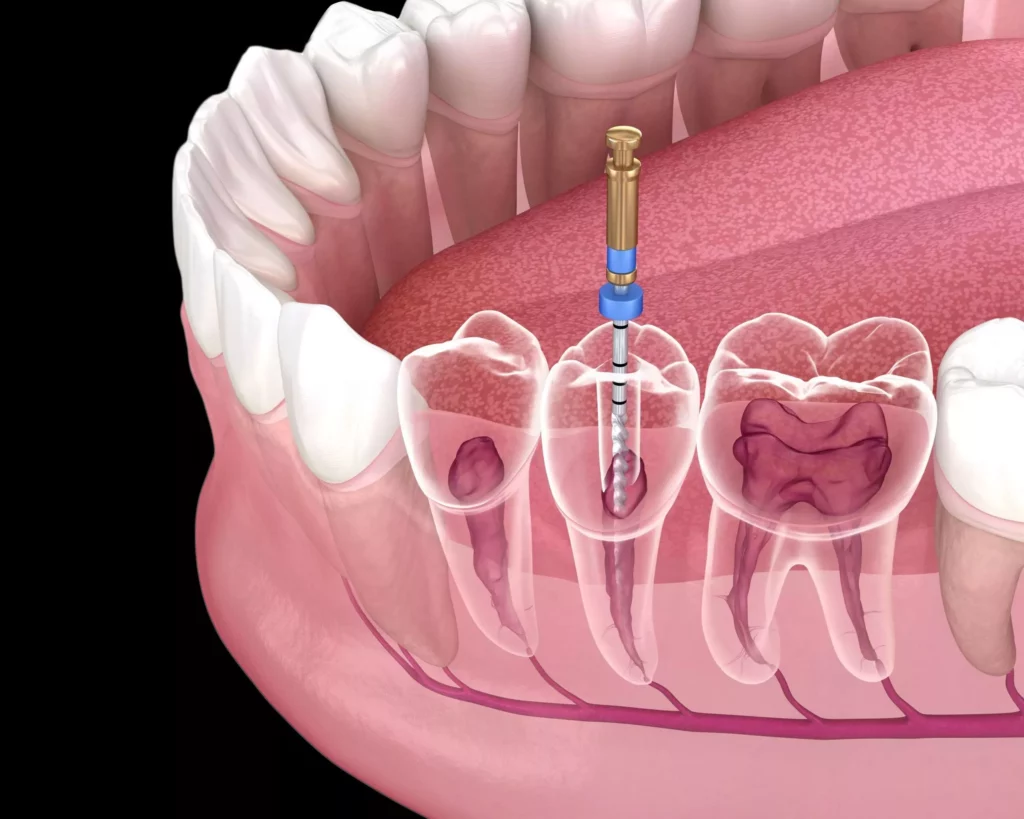Root Canal Treatment
You may suffer from intense pain and sensitivity when you have badly decayed or infected teeth. Titanium Dental Clinic is a Root Canal Treatment in Ahmedabad which comprehensively treats and restores your damaged teeth.
As the leading Dental Clinic in Ahmedabad, we believe in providing easy, safe and lasting dental solutions for you. Root Canal procedure involves cleaning the decay and infection in your tooth by removing the pulp and nerve. Then the cavity is sealed to prevent any further damage. It would be highly dangerous to leave infected tooth untreated. Spreading of infection and abscess formation are inevitable leading to far more dangerous oral and facial health issues.
We are the finest Root Canal Treatment Doctors in Ahmedabad adopting advanced procedure to do our job best. Patients usually complaint of excruciating pain and prolonged suffering while undergoing regular treatment. Our methods minimise pain and enhance the effectiveness of treatment by using latest technology. Get in touch with us for Root Canal Treatment in Ahmedabad and secure your oral health.
What are some symptoms that indicate you may need root canal treatment?
- Tooth pain that doesn’t go away: Many dental problems can cause tooth pain. If you have pain deep in your tooth, you may need root canal therapy. Discomfort may also radiate to your jaw, face or other teeth.
- Sensitivity to heat and cold: If your tooth hurts when you drink hot coffee or eat ice cream, it could mean that you need root canal treatment. This is especially true if the pain lingers for more than a few seconds.
- Swollen gums: When a tooth is infected, pus can collect in the area. This can lead to puffy, swollen or tender gums.
- Pimple on the gums: You may develop a pimple or boil on the gums. Pus from the infected tooth may drain from the pimple, causing an unpleasant taste or smell.
- Swollen jaw: Sometimes pus doesn’t drain from the site. As a result, your jaw may become visibly swollen.
- Tooth discoloration: When the pulp of a tooth becomes infected, it can cause your tooth to look darker. This occurs because of poor blood supply to the tooth.
- Pain when pressure is applied: If you have pain when you eat or touch your tooth, it could mean the nerves around the pulp are damaged.
- A chipped or cracked tooth: If you’ve cracked a tooth in an accident, when playing sports or even by biting down on something hard, bacteria can reach all the way into the tooth pulp.
- Loose tooth: An infected tooth may feel looser. This is because the pus from the infected pulp can soften the bone that supports the tooth.
What happens during the root canal process?
- Anesthesia. First, local anesthesia is given to numb the infected tooth and the surrounding gums. There are also medications used in dentistry to help you relax, such as nitrous oxide, oral sedatives or intravenous (IV) sedation. Your healthcare provider may recommend sedation if you struggle with dental anxiety.
- Dental dam placement. Before beginning root canal treatment, a small rubber dam is placed over the area. This isolates the tooth and keeps it dry during the procedure.
- Access hole. Next, a small opening is made in the crown of the tooth to access the pulp.
- Pulp removal. Tiny dental instruments are used to remove the nerves, blood vessels and tissues inside the tooth.
- Shaping the canals. Once the pulp is removed, the pulp chamber and root canals are cleaned, disinfected and shaped.
- Filling the canals. The empty canals are then filled with a flexible, rubbery dental material called gutta-percha.
- Sealing the tooth. Next, a temporary dental filling is placed to seal the tooth and prevent bacteria from re-entering.
- Placing the final restoration. In most cases, you’ll need a dental crown to protect the treated tooth and restore your bite. Crowns are custom-made, and fabrication usually takes two to three weeks. When your crown is ready, the temporary filling is removed and the permanent crown is placed. In some instances, you may be able to receive a crown during the same appointment.
MOST POPULAR TREATMENTS
Our Services
To schedule your appointment
Office Hours
- Monday-Saturday 10:00 - 6:00pm
- Sunday- Closed


